Key takeaways:
- Recognizing and addressing both environmental and internal distractions is essential for maintaining focus while studying.
- Creating an effective study space, setting clear goals, and utilizing time management techniques can significantly enhance productivity and motivation.
- Incorporating regular breaks and rewards, along with reviewing and adjusting study habits, leads to improved concentration and overall study effectiveness.
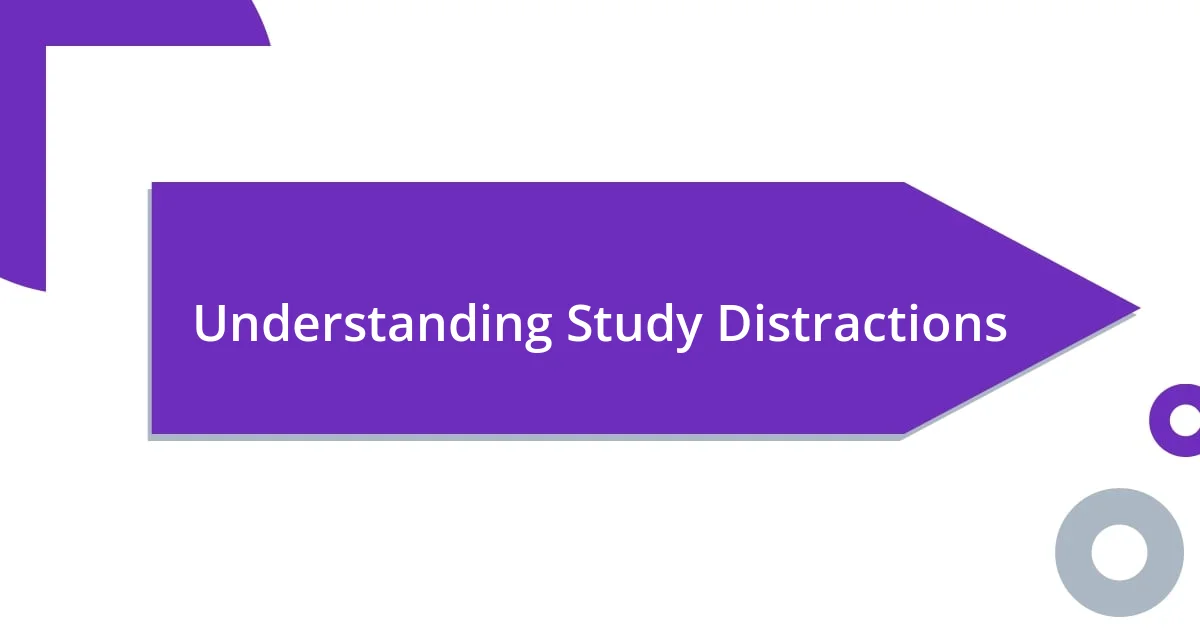
Understanding Study Distractions
Study distractions can manifest in various forms, and recognizing them is the first step toward addressing them. I remember sitting down to study, only to find myself scrolling through social media for hours instead. Have you ever caught yourself lost in your phone, completely derailed from your study goals? It’s frustrating to realize how easily we can slip into these time-wasting patterns.
Environmental factors often play a significant role in distraction, too. For instance, I’ve noticed that working in a noisy café can make it really hard to focus. The chatter and clinking dishes pull me out of my flow, leading me to question the ideal study environment. What about you—do you prefer quiet spaces, or do you thrive on some background noise?
Then there are internal distractions, like racing thoughts or feelings of stress. I’ve had days when I couldn’t concentrate because I was preoccupied with personal issues. When I pause to acknowledge those feelings and set them aside, it becomes easier to channel my attention back to my studies. Have you ever found that just naming your distractions helps in managing them?
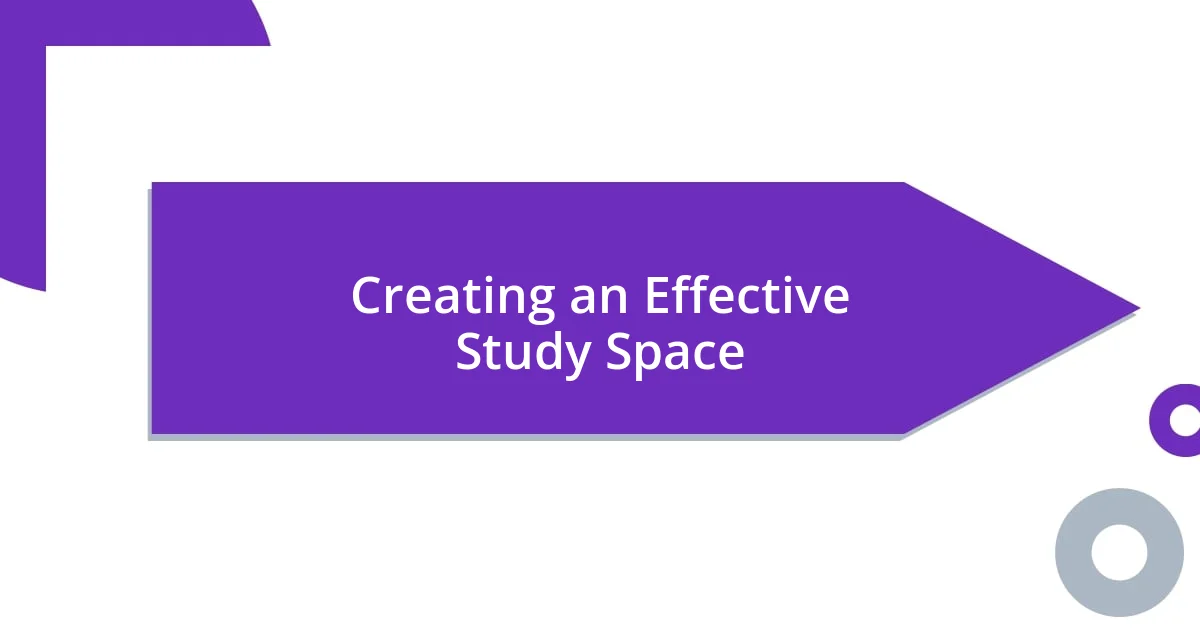
Creating an Effective Study Space
Creating a study space that truly enhances focus is essential for productive studying. I’ve found that having a dedicated area, free from distractions, helps me slip into a productive mindset. For example, when I organized my desk, removing clutter and personal items, I noticed a significant boost in my concentration. It’s like creating a sanctuary for my mind—have you ever experienced how a tidy space can shift your mental state?
Lighting also plays a crucial role in how I feel while studying. I prefer a well-lit area that mimics natural daylight, as it keeps me alert and engaged. Low or harsh lighting tends to make me feel lethargic and less motivated. What kind of lighting do you think helps you maintain your energy?
Lastly, the choice of furniture is often overlooked but can make a significant difference. Investing in a comfortable chair and a sturdy table can drastically improve my study sessions. I remember once using a makeshift setup that left my back aching, making it increasingly difficult to concentrate. Now, I prioritize my comfort, knowing that it directly impacts my ability to focus and absorb information.
| Element | Impact on Focus |
|---|---|
| Cleanliness | A tidy space promotes mental clarity and reduces distractions. |
| Lighting | Bright, natural-like light keeps energy levels up; dim lighting can induce fatigue. |
| Furniture | Comfortable and supportive furniture can enhance prolonged focus. |
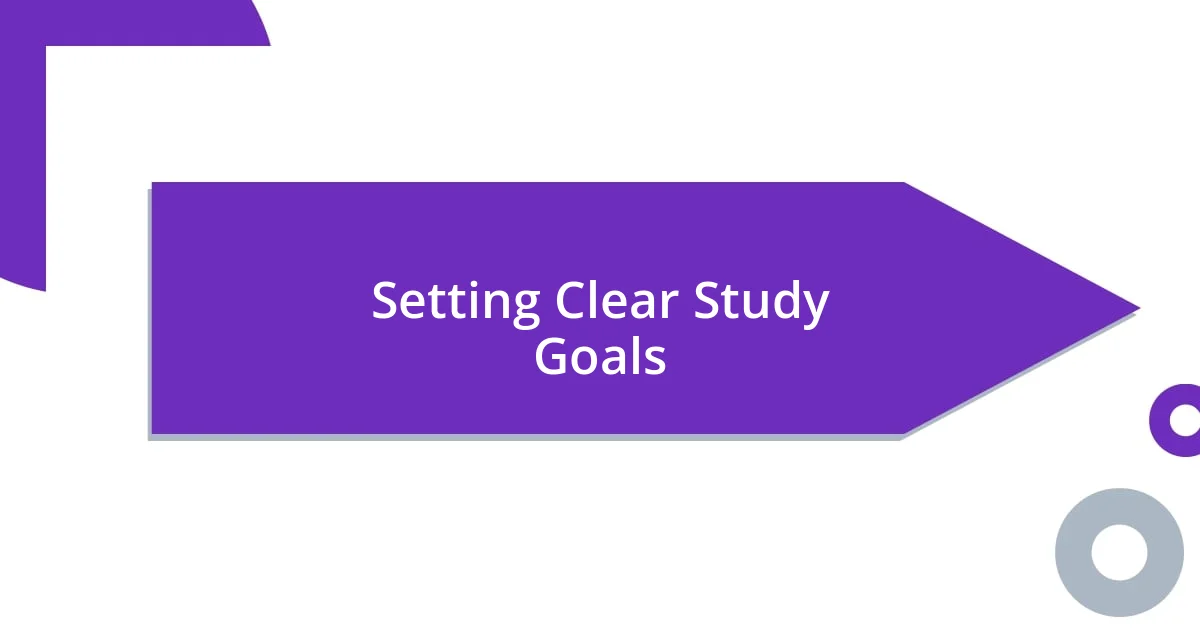
Setting Clear Study Goals
Setting clear study goals is one of the most effective strategies I’ve found to maintain focus and motivation. When I establish specific targets, it feels like I have a roadmap guiding me through my study sessions. For instance, rather than telling myself I need to study biology, I’ll set a goal to complete three chapters and review my notes before the day ends. This specificity helps ignite my drive and makes my tasks feel manageable. Have you ever created a checklist that made you feel accomplished with every item crossed off?
Breaking down my study goals into smaller, actionable steps has been a game changer for me. Here’s how I typically outline these goals:
- Define the Subject Matter: Clearly specify what you need to study (e.g., “Chapter 5 of Math”).
- Set a Time Limit: Determine how long you’ll focus on each segment, be it 25 minutes or an hour.
- Identify Milestones: Create checkpoints, like finishing a chapter or mastering a concept, to mark your progress.
- Reflect on Your Goals: After completing the tasks, I take a moment to assess what I’ve achieved and where I can improve.
It’s amazing how these small adjustments lead to significant shifts in my focus and productivity. What about you? Do you find breaking goals into smaller pieces makes them feel less daunting?
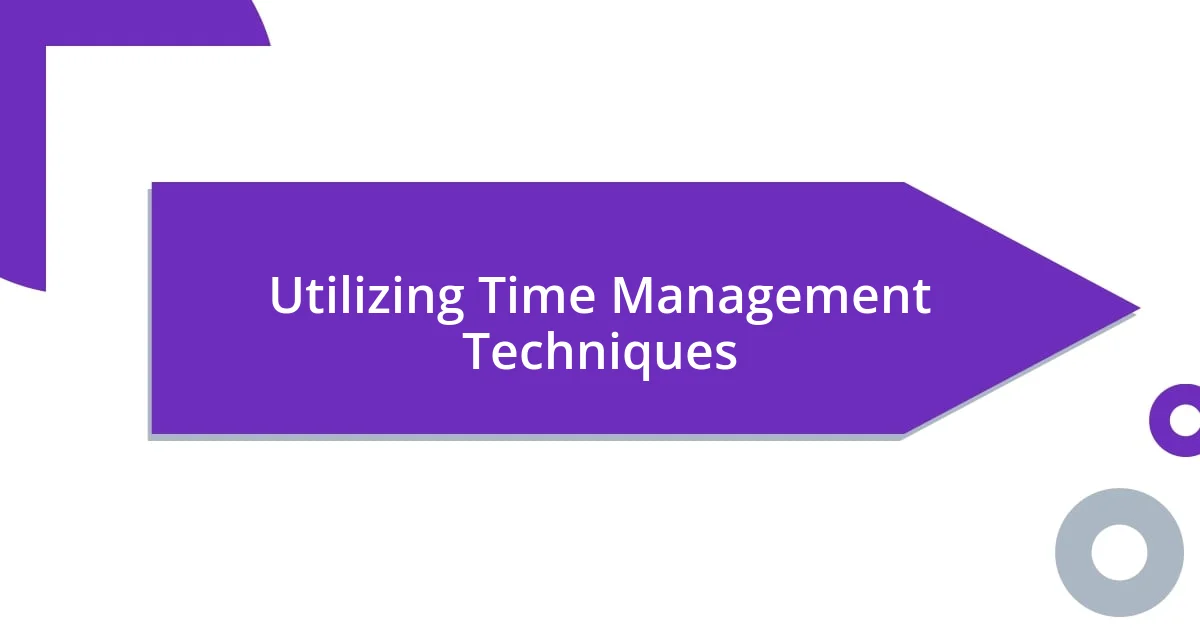
Utilizing Time Management Techniques
Utilizing time management techniques has transformed my approach to studying. One method I’ve found particularly helpful is the Pomodoro Technique, where I study for 25 minutes, then take a 5-minute break. This system keeps my mind fresh and focused during those intense sessions. Have you ever felt that post-lunch slump? Well, this technique helps me power through it by giving me structured refreshment intervals.
Another time management strategy involves prioritizing my tasks using the Eisenhower Matrix, which sorts tasks into four quadrants based on urgency and importance. By categorizing my study materials this way, I often feel less overwhelmed. For example, I realized that studying for an upcoming exam could wait, while preparing for a presentation due soon was urgent and needed immediate attention. How do you decide what deserves your focus during a busy study period?
Lastly, I’ve learned that planning my study week in advance significantly boosts my productivity. I dedicate Sundays to outline what subjects and topics I’ll tackle each day, allowing me to visualize my week. Honestly, this approach feels liberating; it helps eliminate last-minute cramming and gives me peace of mind. I often ask myself, “What small victory can I achieve today that’ll make me proud?” This mindset keeps me motivated and engaged throughout the week. What strategies have you found to keep your study sessions on track?
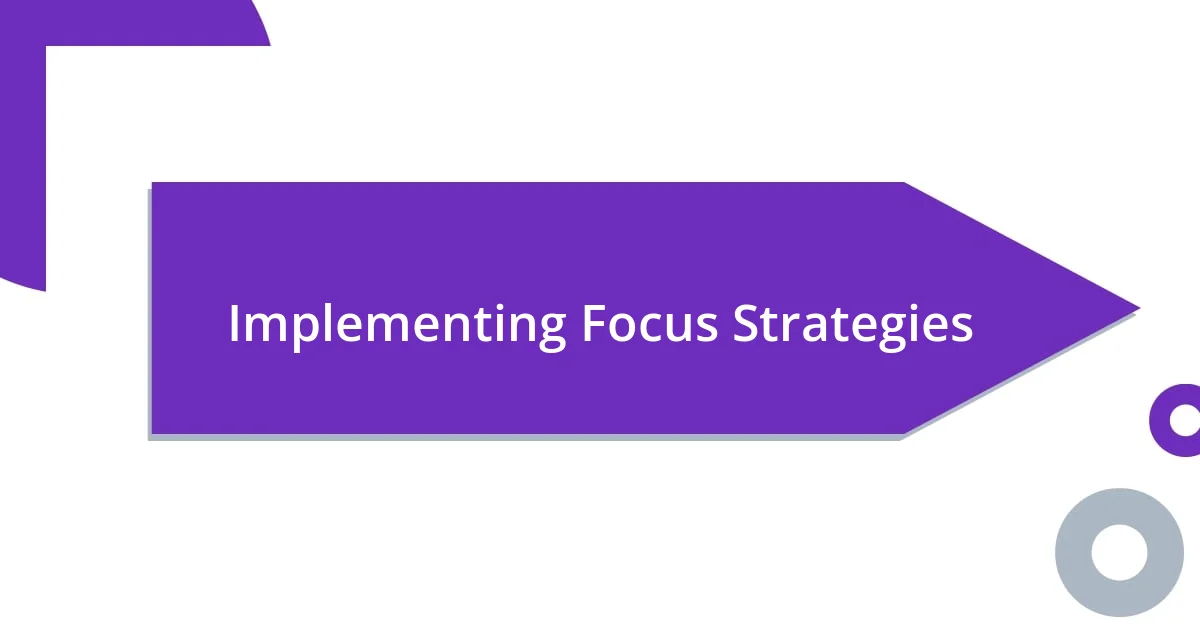
Implementing Focus Strategies
Implementing focus strategies in my study sessions has often felt like discovering personal superpowers. One of the strategies that really resonates with me is using background music. I’ve found that soft instrumental music helps create a calming atmosphere, allowing my mind to dive deeper into the material. Engaging with my subjects feels more like an immersive experience, and I can’t help but wonder, do you also find that certain sounds can transport you into a focused zone?
I also strongly believe in the power of eliminating distractions to boost concentration. I make it a point to turn off notifications on my devices and designate a quiet study space. It’s interesting how much calmer I feel when I know my phone won’t draw me in with a new alert. It’s a little like creating my own oasis for productivity, and I often think about how essential that environment is. Have you ever felt that shift in focus simply by changing your surroundings?
Taking regular breaks is another approach I swear by. After a solid hour of studying, I step away to stretch, grab a snack, or even take a brief walk. I remember one evening when I pushed through too long without a break—my mind felt like a foggy window, and it was impossible to concentrate. Now, I view breaks as little rewards for my hard work, allowing my mind to recharge. It’s those moments of pause that often lead to bursts of creativity or insight. How do you recharge during study sessions?
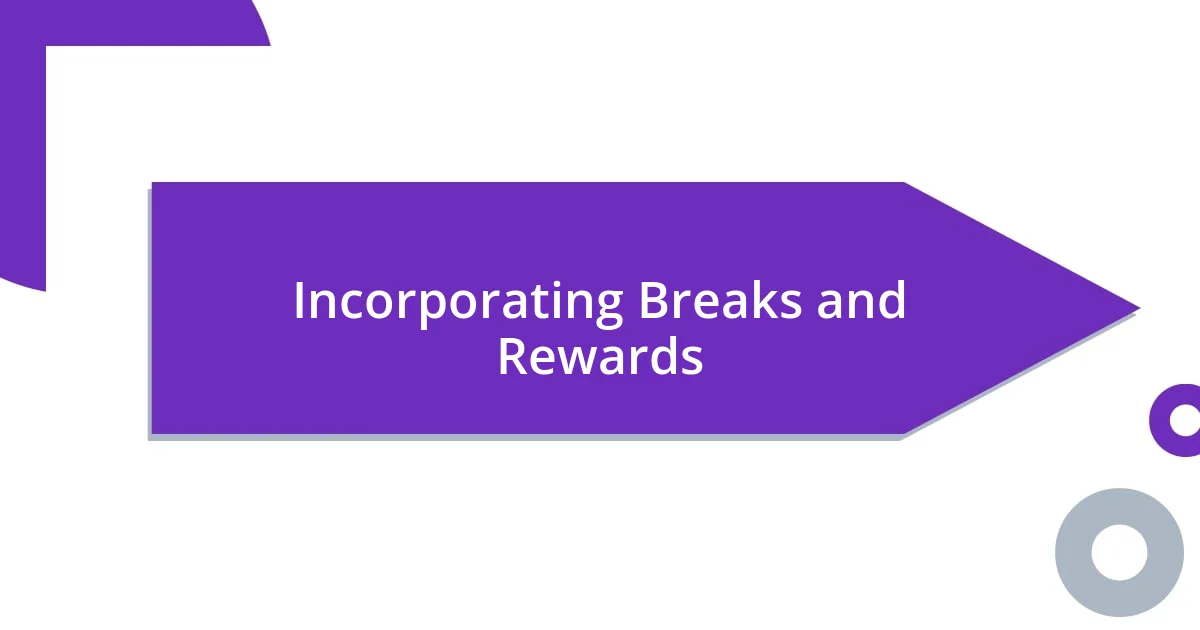
Incorporating Breaks and Rewards
Incorporating breaks into my study routine has been a game-changer. I remember one long night preparing for finals; I got so consumed by the material that I skipped my usual breaks. After hours of relentless studying, I hit a wall. Everything felt jumbled in my mind. Since then, I’ve made it a priority to step away—even if just for a few minutes—to refresh. I can’t help but ask, have you ever experienced a moment where stepping back helped you see the bigger picture?
I also treat these breaks as mini-celebrations or rewards. After completing a tough section, I allow myself to indulge in something small, like a piece of chocolate or a quick episode of my favorite show. Honestly, it’s like giving myself a little pat on the back! This approach not only enhances my motivation but also turns studying into a more rewarding experience. Have you tried rewarding yourself after achieving small milestones? It truly changes how you view those study sessions.
Another strategy I’ve adopted is tracking my break times. I set a timer to ensure I’m hitting those pause moments without getting lost track of time. It helps me maintain that balance, where I’m not burning out but also staying productive. I recall one time I got so lost in a book that I forgot to eat until dinner! Now, I’m much more mindful about when and how I pause. It feels fantastic to know I’m taking care of both my mind and body while studying. How do you keep track of your study breaks?
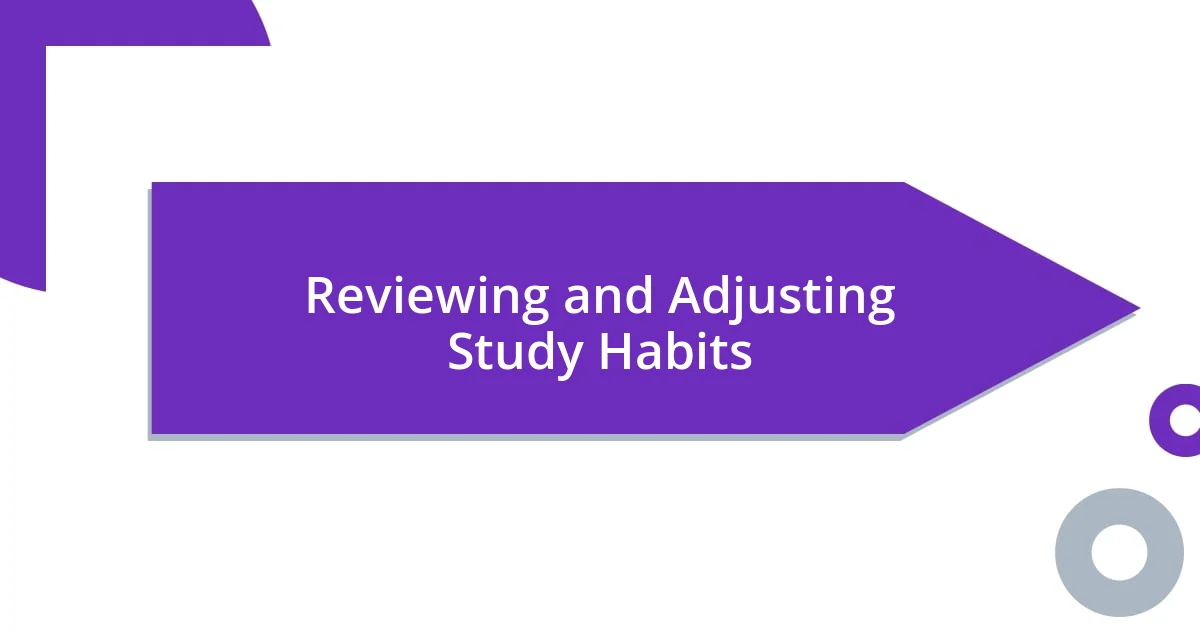
Reviewing and Adjusting Study Habits
I’ve found that regularly reviewing and adjusting my study habits can significantly enhance my productivity. Every few weeks, I sit down and reflect on what’s been working and where I might be falling short. For instance, I once realized that I had been overcommitting to study sessions that were too long and exhausting. By acknowledging this, I adjusted my schedule to include shorter, more focused sessions, and the difference it made was remarkable! Have you ever taken a moment to assess how your current study habits are really serving you?
In one memorable instance, I decided to experiment with different study environments. I started studying at a local café, thinking the ambiance would spark creativity. Unexpectedly, I was more distracted by conversations around me than I anticipated. This experience taught me that a conducive environment is crucial—not just any setting will work. I returned to my cozy corner at home, which transformed my focus. Have you noticed how your surroundings can impact your ability to concentrate?
Another key takeaway from my habit-adjusting journey was discovering the importance of setting specific goals for each study session. I vividly recall a day when I aimed to cover three chapters but ended up skimming them without truly grasping the material. Since then, I focus on one chapter or even a few key concepts at a time. This focused approach enriches my understanding and retention. Have you found that narrowing your focus can lead to deeper learning? It’s fascinating how small adjustments in what we decide to tackle can yield such significant benefits in our studies.














